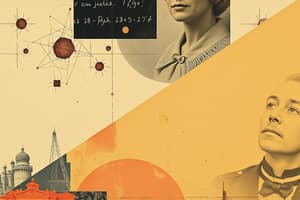Podcast
Questions and Answers
What is the purpose of studying GCSE Maths?
What is the purpose of studying GCSE Maths?
- To focus on physical education and sports
- To obtain essential skills for daily life and future careers (correct)
- To learn about history and literature
- To explore artistic and creative subjects
Which branch of mathematics allows students to study topics like calculus and complex numbers?
Which branch of mathematics allows students to study topics like calculus and complex numbers?
- Algebra (correct)
- Geometry
- Ratio and proportion
- Number
What does the GCSE Maths curriculum cover?
What does the GCSE Maths curriculum cover?
- Physics and Chemistry
- History and Geography
- Literature and Grammar
- Mathematical concepts like algebra, ratio, and geometry (correct)
Which mathematical concept involves rates of change and direct proportions?
Which mathematical concept involves rates of change and direct proportions?
What do students learn in the 'Algebra' section of GCSE Maths?
What do students learn in the 'Algebra' section of GCSE Maths?
In which age range do students typically study GCSE Maths in England, Wales, and Northern Ireland?
In which age range do students typically study GCSE Maths in England, Wales, and Northern Ireland?
What topics are covered in the Geometry section of GCSE Maths?
What topics are covered in the Geometry section of GCSE Maths?
Which career path can be pursued with a specialization in pure mathematics?
Which career path can be pursued with a specialization in pure mathematics?
In what section do students learn about units of measurement in GCSE Maths?
In what section do students learn about units of measurement in GCSE Maths?
What type of assessments can students take at the end of the GCSE Maths course year?
What type of assessments can students take at the end of the GCSE Maths course year?
Which resource can provide extra practice opportunities for GCSE Maths students?
Which resource can provide extra practice opportunities for GCSE Maths students?
What type of careers require strong mathematical abilities?
What type of careers require strong mathematical abilities?
Flashcards are hidden until you start studying
Study Notes
GCSE Maths is a critical qualification that students typically study between the ages of 15 and 16 in England, Wales, and Northern Ireland. It helps prepare them for further education and careers in many fields. There are different types of GCSE Maths courses available, including linear and modular formats, which can vary depending on the examination board. This article will explore what GCSE Maths is, its syllabus, assessment methods, resources, and careers related to it.
What Is GCSE Maths?
GCSE Maths, also known as General Certificate of Secondary Education Mathematics, is a core subject studied by most students during their secondary school years. It provides learners with essential skills and knowledge necessary for everyday life and various careers. Students who excel in mathematics may choose to pursue higher level studies, such as A-level Mathematics or AS/A-level Further Mathematics, allowing them to explore advanced topics like calculus and complex numbers.
Syllabus
The GCSE Maths curriculum covers a range of mathematical concepts, including number, algebra, ratio and proportion, geometry, measures, and statistics and probability. Here's a brief overview of each category:
- Number: Students learn basic arithmetic operations, fractions, decimals, percentages, and exponents.
- Algebra: Topics cover equations, expressions, graphs, and transformations.
- Ratio and proportion: Concepts include rates of change, direct and inverse proportions, and unit conversions.
- Geometry: This section includes angles, triangles, circles, prisms, pyramids, cones, and spheres.
- Measures: Students understand units of measurement, capacity, mass, weight, length, time, speed, temperature, and area.
- Statistics and probability: Topics involve data analysis, probability distributions, and statistical inference.
Assessment Methods
GCSE Maths assessments typically take place at the end of the course year, and there are several ways they can be structured, including written papers, practical tests, and online computer-based examinations. Some schools may offer resits if students do not pass first time, although this varies depending on the institution's policy.
Resources for Learning GCSE Maths
There are numerous resources available to help students study for their GCSE Maths exams. These materials can serve as valuable guides and practice tools for mastering the subject. Here are some examples:
- Textbooks: Published textbooks covering the GCSE Maths syllabus provide a comprehensive learning experience.
- Online platforms: Websites like BBC Bitesize, Senior Maths Challenge, and Mathswatch offer free lesson plans, revision notes, and interactive activities designed to support student understanding.
- Supplementary worksheets and exercises: Additional materials from reputable sources like Khan Academy can provide extra practice opportunities.
- Practice assessments: Past examination papers and sample questions can help students familiarize themselves with the format and timing requirements of real GCSE Maths exams.
Careers Related to GCSE Maths
GCSE Maths can open doors to a wide variety of careers. Some popular options include:
- Mathematical Sciences: Students can specialize in areas like pure mathematics, applied mathematics, or statistics, leading to roles such as data analysts or actuaries.
- Engineering and Technology: Mathematics is essential for fields like computer science, engineering, physics, and electronics.
- Finance and Accountancy: Math skills are crucial in finance, banking, investment, and accounting careers.
- Education and Research: Those with strong mathematical abilities may pursue roles in teaching, research institutions, or scientific positions.
GCSE Maths is an integral part of students' secondary education, preparing them for further studies and various career paths. By understanding its syllabus, assessment methods, resources, and potential career opportunities, learners can make the most out of their experience and set themselves up for success in mathematics and beyond.
Studying That Suits You
Use AI to generate personalized quizzes and flashcards to suit your learning preferences.




